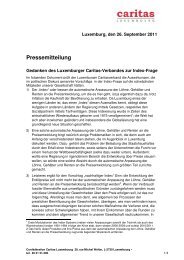Sozialalmanach - Caritas Luxembourg
Sozialalmanach - Caritas Luxembourg
Sozialalmanach - Caritas Luxembourg
Create successful ePaper yourself
Turn your PDF publications into a flip-book with our unique Google optimized e-Paper software.
Conjecturing welfare regime change<br />
in the wake of the first crisis<br />
of 21 st century global capitalism 1<br />
A N t o N H E M E R I J C K<br />
1. Anticipating aftershocks<br />
One year after the Great Crash of September 2008, policymakers everywhere are<br />
anxiously awaiting signals of whether or not we have passed the nadir of the global<br />
downturn. Is the economy finally gaining traction after the worst economic crisis since<br />
the Great Depression? While financial conditions may have started to ease, the jury is still<br />
out on whether 2010 will indeed bring a ‘V-shaped’ upturn, with its much hoped-for swift<br />
return to pre-crisis levels of growth. But given the severity of the crisis, we could just as<br />
well be heading for the beginning of a longer, more drawn out, slow and weak ‘L-shaped’<br />
recovery, akin to the experience of Japan’s ‘lost decade’ of the 1990s. Worse still is the horrific<br />
scenario of a ‘W-shaped’ economic nightmare, whereby an apparently swift recovery, paid<br />
for by ballooning budget deficits, sets the stage for another bubble, triggering runaway<br />
inflation which, in turn, can only be reined in with an aggressive hike in interest rates by<br />
central banks, setting the stage for a second deep recession in the aftermath of the present<br />
crisis. With such uncertainty, is talk of ‘green shoots’ not premature?<br />
There is every reason to remain cautious about forecasting economic improvement.<br />
In the years ahead, various social and political aftershocks, caused by the momentous<br />
economic contraction of the global downturn, will have to be reckoned with. First, there<br />
is the aftershock of the looming crisis of unemployment. Unemployment usually lags<br />
behind general economic activity by roughly a two- to three-quarter delay, so labour market<br />
conditions in the advanced industrial world are expected to worsen in the coming years,<br />
even as stock markets improve across the globe. US unemployment is currently just below<br />
10%, while in Europe unemployment has already reached double digits in many countries.<br />
Most worrisome is the surge in youth employment: in Latvia, Italy, Greece, Sweden, Estonia,<br />
Hungary, Lithuania, France, Ireland, and Belgium, youth unemployment has crossed the<br />
20% threshold, and in Spain it is over 30%. Increasing unemployment may also result in<br />
1 This contribution spotlights the forthcoming publication “In Search of a New Welfare State” (Oxford<br />
University Press).<br />
147








